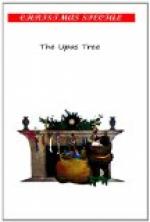“No,” said Helen, gazing straight before her into the fire, “the heap upon the floor was not Ronnie.”
“But—I am positive!—I saw it myself! I saw you kneeling beside it. I helped to sort it, afterwards. The actual heap on the floor was the broken chair, Ronnie mixed up with it; and, on top of both, that unholy Infant, whose precocious receptivity is responsible for the entire business. I exonerate the Florentine chair; I exonerate poor Ronnie. I shall always maintain that that confounded ’cello worked the whole show, out of its own unaided tummy!”
But Helen did not laugh. She did not even smile. “The heap on the floor was not Ronnie,” she repeated firmly, “nor was I kneeling beside it. The Italian chair had not fallen over. Not a single thing appertaining to the present, was reflected in the picture as I first saw it. Dick, there was a conclusion to my vision of which I have never told you.”
“Oh, lor!” said Dick. “When I guaranteed the psychic chap that I was putting him in full possession of every detail!”
“I am sorry, Dick. But until this moment I have never felt able to tell you. I cannot do so now, unless you are nice.”
“I am nice,” said Dick, “very nice! Tell me quick.”
“Well, as I knelt transfixed, watching—the heap on the floor moved and arose. It was a slight dark man, with a white face, and a mass of tumbled black hair. He lifted from off his breast as he got up, a violoncello. He did not look at the woman, nor at the man in the crimson cloak; he stood staring, as if petrified with grief and dismay, at his ’cello. Following his eyes, I saw a dark jagged stab, piercing its right breast, just above the f hole. The anguish on the ’cellist’s face, was terrible to see. Then—oh, Dick, I don’t know how to tell you!”
“Go on, Helen,” he said, gently.
“Then he turned from the ’cello, and looked at me; and, Dick, it was the soul of Ronnie—my Ronnie—in deepest trouble over his Infant of Prague, which looked at me through those deep sad eyes. I cannot explain to you how I knew it! He was totally unlike my big fair Ronnie, but—it was the soul of Ronnie, in great distress, looking at me! The moment I realised this, I seemed set free from the past. The ’cellist, the woman, the Avenger, all vanished instantly. I saw myself reflected, I saw you, I saw the studio; I saw Ronnie on the floor. I turned to him at once, lifted the ’cello from his breast, and drew his head into my lap.”
“Was there a jagged hole—”
“No, not a scratch. The stab belonged to a century ago. But, listen Dick! Several days later, when I had a moment in which to remember Ronnie’s poor Infant of Prague, I examined it in a good light, and found the place where the hole made by that dagger had been skilfully mended.”
“Lor!” said Dr. Dick. “We’re getting on! Don’t you think you and I and the Infant might put our heads together, and write a psychic book! But now—seriously. Do you really believe Ronnie was once a slim, pale person, with a shock of black hair? And if he and his Infant lived together in past ages, where were you and I? Are we altogether out of it? Or are you the lady with the dagger, and I the noble party in the flaming cloak?”




